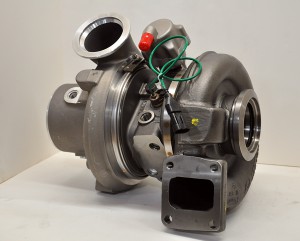 Over the years of writing this article I have often compared trucks to the human body. Think about it: both of them need clean oxygen, a good source of fuel or food, and both must get rid of their waste in a timely manner. Have you ever been constipated? What do you think happens to your engine when the muffler is clogged or the exhaust flow is impeded? Look at the effects of cigarettes on your lungs or how hard it is to breathe when you have a chest cold – your engine feels the same way when its air filter is dirty or is too small for the horsepower it is developing. Your oil is the life-blood of your truck’s engine, so let’s talk about some proper oil maintenance topics and also look at some other human/truck analogies.
Over the years of writing this article I have often compared trucks to the human body. Think about it: both of them need clean oxygen, a good source of fuel or food, and both must get rid of their waste in a timely manner. Have you ever been constipated? What do you think happens to your engine when the muffler is clogged or the exhaust flow is impeded? Look at the effects of cigarettes on your lungs or how hard it is to breathe when you have a chest cold – your engine feels the same way when its air filter is dirty or is too small for the horsepower it is developing. Your oil is the life-blood of your truck’s engine, so let’s talk about some proper oil maintenance topics and also look at some other human/truck analogies.
The next time you are crossing over Vail Pass on I-70 at the elevation of 10,400 feet, pull into the rest area and run up the hill alongside the interstate. How far can you get before your lungs and heart have you gasping for air (oxygen)? With this analogy in mind, stop expecting your engine to pull at 10,000 feet like it does at sea level. The air only has half the molecules of oxygen at 10,000 feet as compared to sea level. If it’s too hot and humid outside for your body to do physical work, then it’s also too hot for your engine. Likewise, if it’s too cold for you, it’s probably too cold for your engine, as well. When the temperature is below zero and you see white smoke coming out of the stacks, the engine is telling you that it is breathing air that is too cold and, as a result, the fuel is not burning properly.
Today, we ask for a lot out of our engines, and far too many people assume that the ECM will automatically take care of everything. This is not true – you still need to employ some common sense when driving and maintaining your truck. There is that pesky “maintaining” word again. Let’s face it, most people today do as little as possible in regards to maintaining their truck. How many times a year do you get under your truck to grease it, change the oil, check and adjust the brakes, and to inspect the air lines, exhaust system and driveline? Probably not often enough. All of the time I hear people say, “I just drive this truck, I don’t work on it.” Well, I’m sorry for you, because you are missing out on one of the privileges of owning a vehicle.
Keeping your oil clean is one of the most important things you can do to protect your engine. If you run with dirty oil, all of your engine parts will wear out much faster. Back in the late 1970s, we at Pittsburgh Power started using 1-micron by-pass oil filters and began analyzing engine oil. Back then, the average oil change interval on Cummins, Caterpillar and Detroit Diesel engines was 10,000 miles. With by-pass oil filtration, we could increase it to 15,000 miles, and our engine parts never wore out prematurely.
 To test your maintenance routines, pull the valve cover off of your mechanical engine and rub your hands on the rocker levers – you should find no dirt. Engines make their own dirt through the process of combustion (burning of the fuel), and although the filters take out most of the dirt, every firing of an injector results in more dirt in the oil. In addition, since 2003, with the coming of the “EGR” engines, the soot that usually collected in the muffler and then blew out the stacks is now being put right back into the intake manifold to be burned again. This is just one more reason why it is so important to keep your oil clean.
To test your maintenance routines, pull the valve cover off of your mechanical engine and rub your hands on the rocker levers – you should find no dirt. Engines make their own dirt through the process of combustion (burning of the fuel), and although the filters take out most of the dirt, every firing of an injector results in more dirt in the oil. In addition, since 2003, with the coming of the “EGR” engines, the soot that usually collected in the muffler and then blew out the stacks is now being put right back into the intake manifold to be burned again. This is just one more reason why it is so important to keep your oil clean.
Let’s go back out to Vail Pass. Imagine taking a clear plastic tube and putting it in one of your nostrils, and then placing the other end of the tube in your other nostril in a way that allows some fresh air to still also get in. Now, try running up that hill again. Do you think you can get as far as you did before recirculating your own exhaust back into your nose? Heavens no! The air coming out of your nose doesn’t have soot in it, but the exhaust coming out of the engine does (on EGR engines), and it’s going right back into the intake manifold, forcing the engine to attempt to burn it again. But, since there is no oxygen to burn, the soot is left to scrub up and down the cylinder walls. As a result, this is wearing out your engine’s valve guides, the rod and main bearings, the cam bearings, camshafts, cam followers, and all of the thrust washers.
And let’s not forget about your turbocharger. Turbos idle at 8,000 rpm and, when pulling a mountain, can get up to 110,000 rpm. The turbocharger does not have bearings – they have sleeves that “float” on a film of oil, and the sleeves spin at half the speed of the shaft, or up to 55,000 rpm when pulling. If your oil is dirty, the soot and particulates in it will get into the turbo and wear it out prematurely. You might expect your warranty to cover the costs, but if your engine oil is filthy and the iron (FE) count is too high after being analyzed, it may not be covered. Having iron particles in your oil is like having sandpaper in the engine and it will wear stuff out – especially turbochargers.
When you decided to become an owner operator, you took on the responsibility of maintaining your truck, especially changing the oil. Since the early 1980s, I have said that if the iron (FE) in your oil is at 20 parts per million or less, your engine will run for well over a million miles, but if it is above that, you are playing with fire. We currently have a truck in our shop getting a new camshaft and cam followers, and its oil analysis showed the iron count to be between 60 and 79 parts per million. The cost of the ISX camshaft and cam followers, along with labor, is about $7,000. So, you can figure out how many oil changes that $7,000 could have paid for. The choice is yours: change your engine oil regularly or replace parts prematurely.
By-pass oil filtration is a wonderful thing – it extends the life of the oil and the engine, but you still need to change the oil – just not as often. Parts don’t lie. When we take apart your turbocharger or engine, we can tell how well you maintain your truck. Your engine is the “heart” of your truck, which makes your entire career on the road possible, so take care of it – especially the oil, which is your engine’s life-blood pumping through it. Take care of it, and it will take care of you! If you have any comments or questions, I can be reached at Pittsburgh Power Inc. in Saxonburg, PA by calling (724) 360-4080 or via e-mail at bruce1@pittsburghpower.com.
